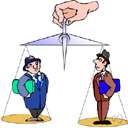fairness
Also found in: Thesaurus, Financial, Idioms, Encyclopedia, Wikipedia.
fair 1
(fâr)These adjectives mean free from favoritism, self-interest, or preference in judgment. Fair is the most general: a fair referee; a fair deal. Just stresses conformity with what is legally or ethically right or proper: "a just and lasting peace" (Abraham Lincoln).
Equitable implies justice dictated by reason, conscience, and a natural sense of what is fair: an equitable distribution of gifts among the children. Impartial emphasizes lack of favoritism: "the cold neutrality of an impartial judge" (Edmund Burke).
Unprejudiced means without preconceived opinions or judgments: an unprejudiced evaluation of the proposal. Unbiased implies absence of a preference or partiality: gave an unbiased account of her family problems. Objective implies detachment that permits impersonal observation and judgment: an objective jury. See Also Synonyms at average, beautiful.
fair 2
(fâr)Fairness
a cat may look at a king Even an inferior has certain rights in the presence of a superior. This proverb, which dates from 1562, was used by Robert Greene in Never Too Late (1590):
A cat may look at a King, and a swain’s eye has as high a reach as a lord’s look.
even break An equal or fair chance; no advantage or handicap; as much or little chance as the next person. Of American origin, this colloquial expression may derive from the custom whereby opponents break a stick to determine who will have the advantage in a given situation. The long end is the preferable portion; the short goes to the loser. However, if the break is even, neither party has an advantage—each party has an equal chance. Even break dates from the early part of this century.
The chances in the “quartermile” seem to give the Americans only an even break for a first place. (Daily Express, July 11, 1928)
every dog has his day Just as “the meek shall inherit the earth,” everyone will come into a period of power or influence. This proverbial expression dates from the time of the Greek poet Pindar in the 5th century B.C.
Thus every dog at last will have his day—
He who this morning smiled, at night may sorrow;
The grub today’s a butterfly tomorrow.
(Odes of Condolence)
fair shake Just, equitable, unbiased treatment; an even break. In this expression, shake refers to a throw of the dice. Unscrupulous gamblers often use shaved or loaded dice to increase their chances of winning. A fair shake implies that no cheating or other undue influence has been employed to affect a situation, and that the situation has been resolved justly.
a place in the sun See FAME.
| Noun | 1. |  fairness - conformity with rules or standards; "the judge recognized the fairness of my claim" fairness - conformity with rules or standards; "the judge recognized the fairness of my claim"non-discrimination - fairness in treating people without prejudice sportsmanship - fairness in following the rules of the game inequity, unfairness - injustice by virtue of not conforming with rules or standards |
| 2. | fairness - ability to make judgments free from discrimination or dishonesty impartiality, nonpartisanship - an inclination to weigh both views or opinions equally unfairness - partiality that is not fair or equitable | |
| 3. |  fairness - the property of having a naturally light complexion fairness - the property of having a naturally light complexion | |
| 4. |  fairness - the quality of being good looking and attractive fairness - the quality of being good looking and attractivebeauty - the qualities that give pleasure to the senses |
fairness
"One should always play fairly when one has the winning cards" [Oscar Wilde An Ideal Husband]
fairness
nounfairness
[ˈfɛənɪs] Nin all fairness (= truth to tell) → a decir verdad, en honor a la verdad; (= to be fair) → para ser justo
in all fairness, he had to admit that she had a point → para ser justo con ella, tenía que reconocer que llevaba algo de razón
in (all) fairness to him → para ser justo con él
fairness
[ˈfɛərnɪs] n (= justness) [decision, trial, verdict] → équité f; [competition, contest] → impartialité f; [treatment] → équité f; [person] → sens m de la justicein fairness, in all fairness → en toute justiceFairness Doctrine n (US) → principe m de l'impartialitéfair play n → fair-play m invfair sex fairer sex n → beau sexe mfair-sized [ˌfɛərˈsaɪzd] adj → assez grand(e)fair-skinned [ˌfɛərˈskɪnd] adj (with pale skin) → à la peau clairefairly-traded [ˌfɛərliˈtreɪdɪd] adv [product, coffee, chocolate] → issu(e) du commerce équitable, équitablefair trade
fairness
fairness
[ˈfɛənɪs] nin all fairness → per essere giusti, a dire il vero
in (all) fairness to him → per essere giusti nei suoi confronti